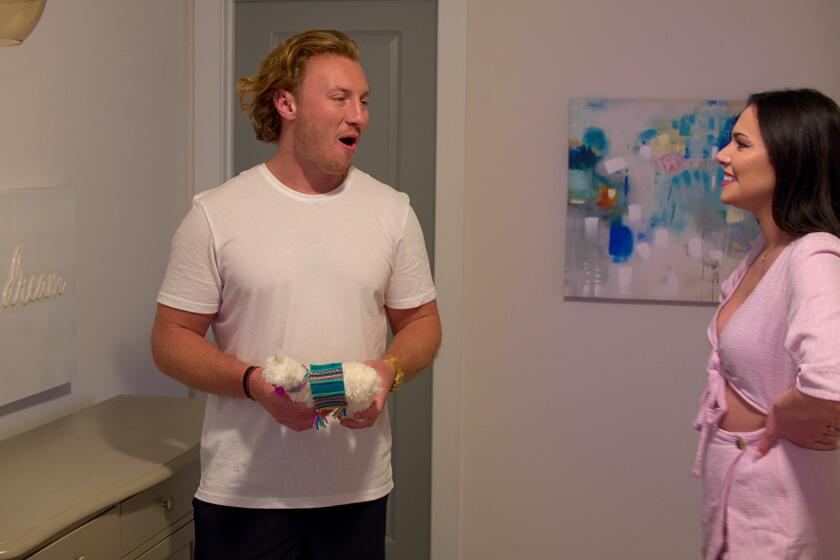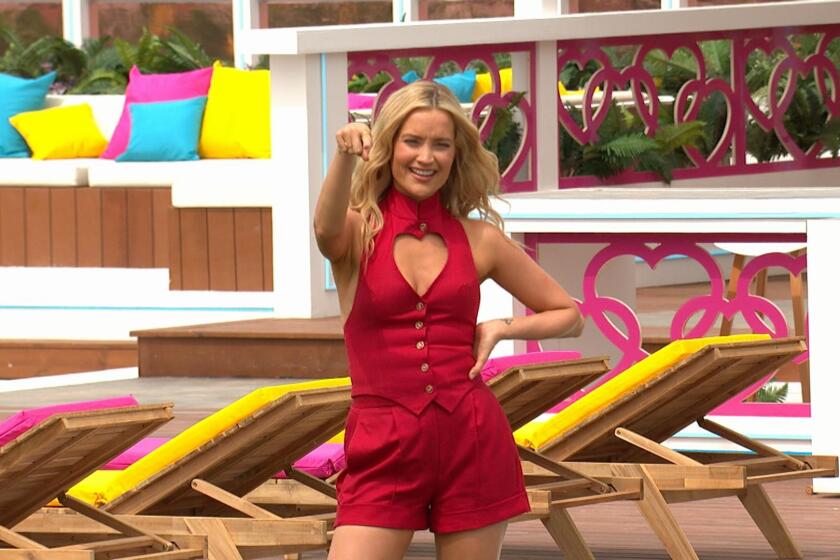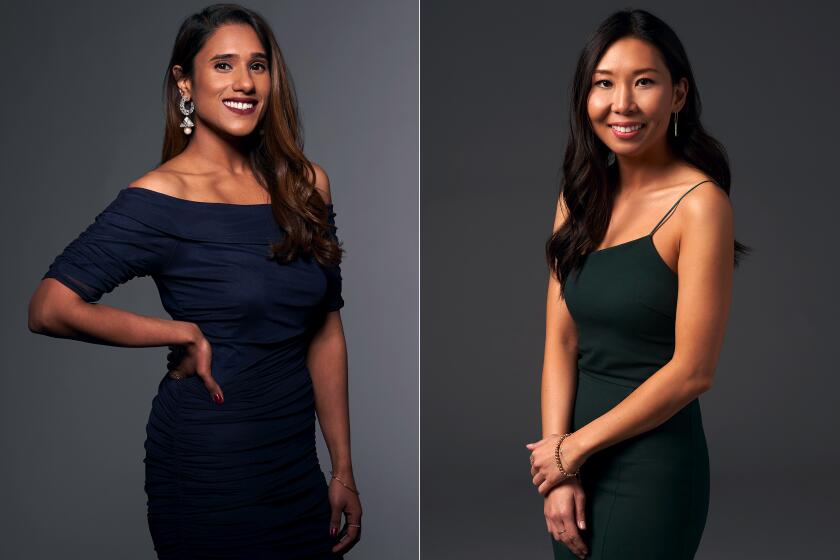How a bantering British twist on ‘Love Is Blind’ revitalized Netflix’s hit reality franchise
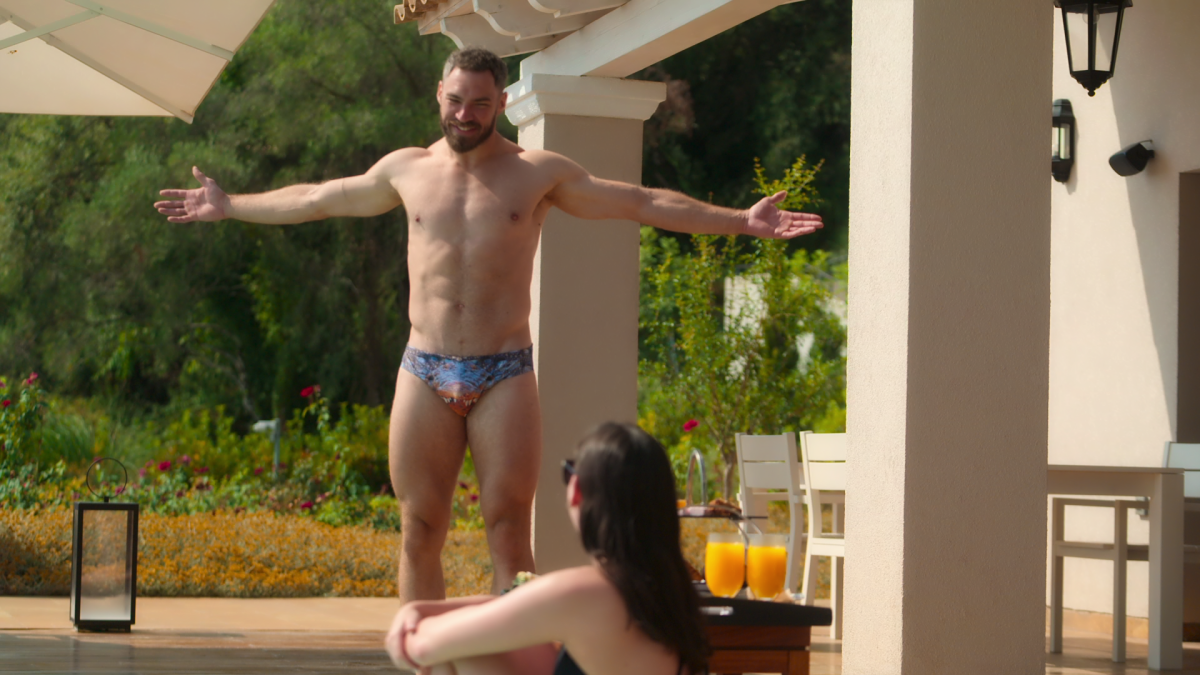
- Share via
Love may be blind — but does it care about your accent?
That’s one of the many questions confronted by contestants on “Love Is Blind: U.K.,” the latest international spin-off of the hit Netflix reality show about singles who fall in love through a wall and then decide if they want to get married after meeting face-to-face.
Over six seasons based in cities across the United States, the original “Love Is Blind” has resulted in 11 marriages, two divorces, a bunch of lawsuits and two babies (so far). Japanese, Swedish and Brazilian versions of the show — excuse me, “experiments” — have also led to successful relationships. But lately the American prototype has been showing signs of the strain that affects virtually every established reality show, thanks to too many fame-thirsty contestants who know the rules of the game.
In Season 6 of ‘Love Is Blind,’ Johnny McIntyre and Amy Cortés discuss birth control, which stands in contrast to talks contestants have had on abortion.
Enter “Love Is Blind: U.K.,” which put a distinctly British twist on the formula when it premiered earlier this month — and has emerged as a welcome return to form for the franchise, delivering a satisfying blend of enjoyable mess and heartwarming love stories.
The latest incarnation takes the “Love Is Blind” hallmarks — the golden wine goblets, the windowless pods that look like Ikea displays, the delusional villain, the scarcely-seen hosts who pop up just as you’ve forgotten their existence — and presents them in a context that’s new enough to make things interesting. The show features an array of colorful Britishisms and lovely regional accents, some oddly formal terminology (for some reason, the “ladies’ lounge” is known as the “female living quarters”) and a wedding venue fit for a Jane Austen adaptation.
By the time the weddings rolled around last week, six couples were heading down the aisle. Miraculously, some of them were even likable, and several actually wound up saying “I do.” Now, with Monday’s reunion, we’ll delve into who’s still together a year after filming wrapped.
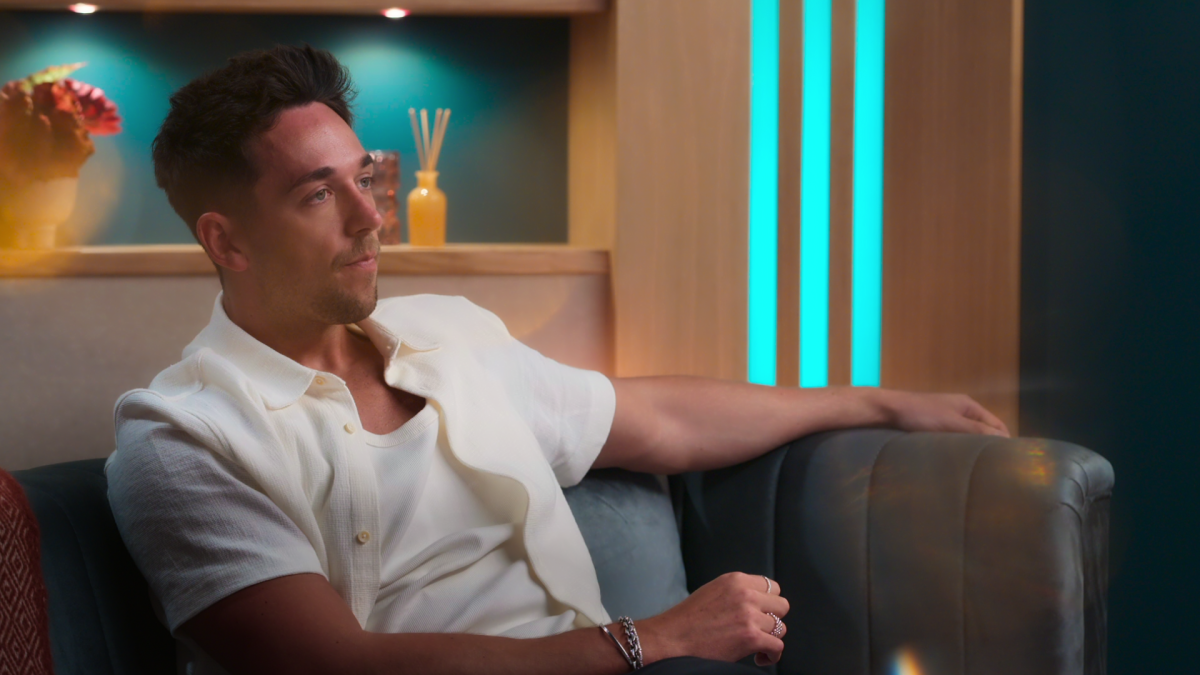
If, as the old adage goes, England and America are two countries separated by the same language, then the original “Love Is Blind” and its U.K. counterpart are two reality shows united by shared tropes.
Like millions of other people, “Love Is Blind: U.K.” executive producer Nazleen Karim got hooked on “Love Is Blind” during COVID-19 lockdown. “What I loved about it was how relatable the cast felt, and how they really wanted something a little bit different,” she said in a Zoom call from her home in London. “We haven’t seen people wanting a deep lifelong connection on other reality shows in quite the same way.”
When it came to adapting the show for the U.K., Karim said she stuck to the established schedule and format, but had some concerns about how a nation known for its reserved temperament would do in a show that requires people to spill their guts to someone they’ve never laid eyes on. “For us the only question was, ‘Will Brits be able to emote in the same way as people in the U.S. have done?’ ” she said. “Very quickly, it proved that Brits could feel all the feels and talk about their emotions in a really honest and open way, which we found really refreshing.”
Think you can’t watch 60 episodes of people sitting around a pool? Think again!
The U.K. is hardly new to over-the-top dating shows, like “Naked Attraction,” “Sex Box” and, of course, the summertime ritual that is “Love Island.” While those shows traffic in outrageousness and raunch, anyone expecting a bunch of spray-tanned wannabe influencers may be pleasantly surprised by “Love Is Blind: U.K.,” which features a cast of (mostly) earnest, likable people with what appear to be their original teeth.
“Those shows are primarily for dating, whereas this is for a lifelong partnership. It has more gravitas to it,” Karim said. “With marriage being the stakes, that tends to weed out a lot of people.” She added that while “Love is Blind” is popular in the U.K., “There were lots of British guys who still hadn’t heard of the concept. What we found is people do watch the show over here, but they tend to watch with their husbands or boyfriends. So a lot of men don’t know about it.”
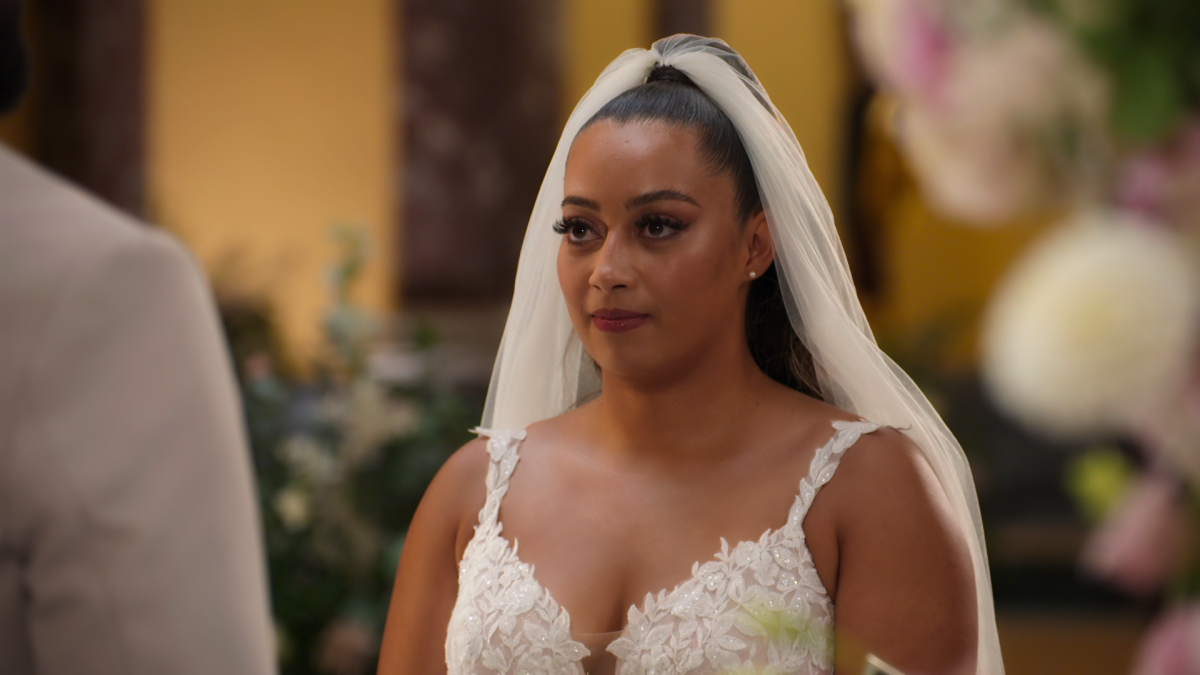
Also setting “Love Is Blind: U.K.” apart is the maturity of the cast. Contestants range in age from 27 to 38 — much older than your typical inhabitant of the “Love Island” villa, and even a few years older, on average, than American “Love Is Blind” contestants, who have been as young as 24.
One of the breakout stars of the season is Demi, 30, a sports-loving Londoner who struggles with insecurities but ultimately finds the confidence to make the right call about her relationships. “Someone like Demi is really relatable, especially to lots of women across the world. Her journey of self-discovery and self-love is probably one of the most beautiful love stories to come out of this series,” Karim said. Another standout is Freddie, 32, a funeral director with a heart of gold and abs carved from marble.
No reality show would be complete without a villain, and “Love Is Blind: U.K.” has Sam, 31, who told his fiancée she has “boring brown eyes” minutes after seeing her for the first time. Shockingly, the engagement does not last.
Fan favorites Natalie Lee and Deepti Vempati open up about their relationships with Shayne and Shake on the Netflix show, from the pods to the altar.
In a departure from the American version of the series, which casts people from a single geographic region each season, “Love Is Blind: U.K.” features cast members from across England, Scotland and Northern Ireland.
“We’re much smaller here, so we can pull that off,” said Karim. “But there’s also something quite celebratory about having the whole of the U.K. [in the show] — the accents, the regional diversity. There are lots of presumptions within us all about, ‘Oh, you’ve got that accent, so you’re that way.’ Breaking those stereotypes was really lovely, and just enjoying the musicality of everyone’s turns-of-phrases.” There’s also a host of British slang, like “punching” (short for “punching above your weight”), often used in self-deprecating fashion; the term “cheeky chappy,” for a puckish fellow ; and “budgie smuggler,” for a body-hugging, Speedo-style men’s swimsuit.
Another distinctive feature of the U.K. version is the witty, playful style of flirting and the emphasis on “banter.” “It actually is one of our love languages,” Karim said. “We use flirty banter, which is also called ‘flanter,’ and tend to take the mickey out of one another, or be quite sarcastic.”
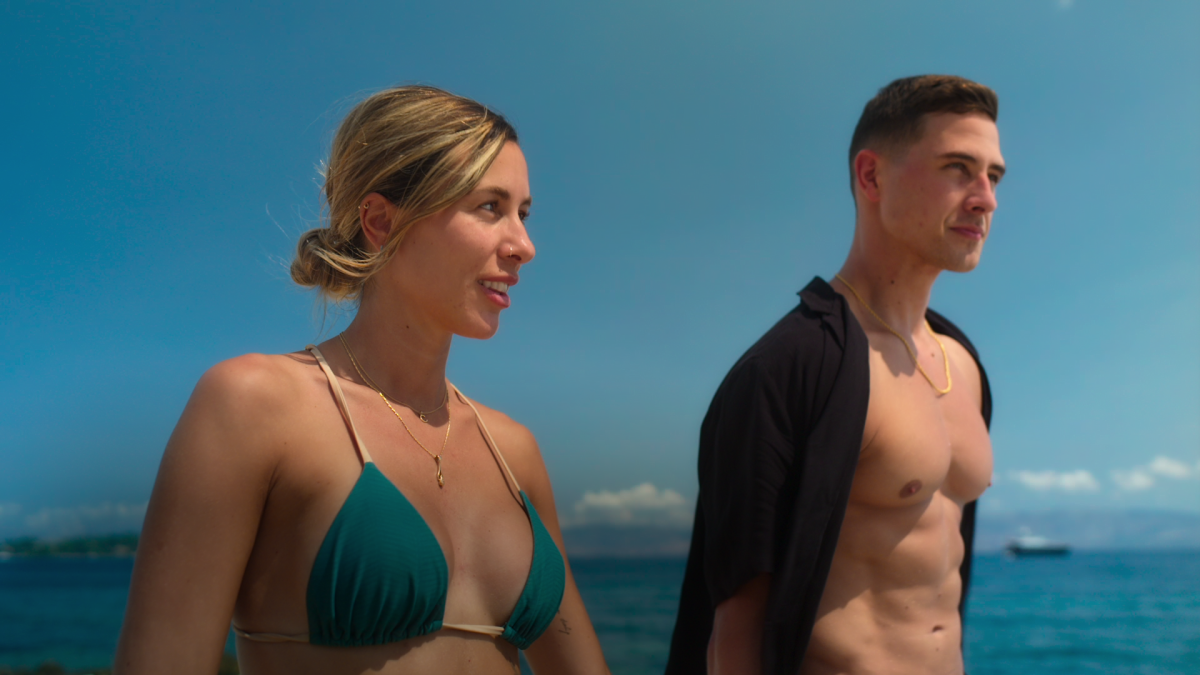
Karim was adamant about using the golden wine glasses that have thrilled and puzzled viewers since Season 1 back in 2020. “It was one of our big questions. When we first started, we asked Netflix, ‘Will we be getting the goblets?’ They were like, ‘Absolutely, it’s so synonymous with the show,’ ” she said.
But she also tried to put a British visual spin on the show. “We really love an explosion of color,” Karim said, which is why the hallways were painted “a bright Cadbury’s purple.” The weddings took place at Wynyard Hall, a vast estate in County Durham once inhabited by the Vane-Tempest-Stewart family but now used as an event space. “We’ve got these incredible old historic buildings in the U.K.,” she said.
In the end, Karim said the minor cultural differences of “Love Is Blind: U.K.” are nothing compared to the universal story of love — and the awareness that, by potentially helping people find their life partners, she could “be creating legacies for a future generation.”
“That’s why I say we’ve got a real responsibility,” Karim said. “What other job do you get to go to work and watch people fall in love?”
More to Read
The complete guide to home viewing
Get Screen Gab for everything about the TV shows and streaming movies everyone’s talking about.
You may occasionally receive promotional content from the Los Angeles Times.
